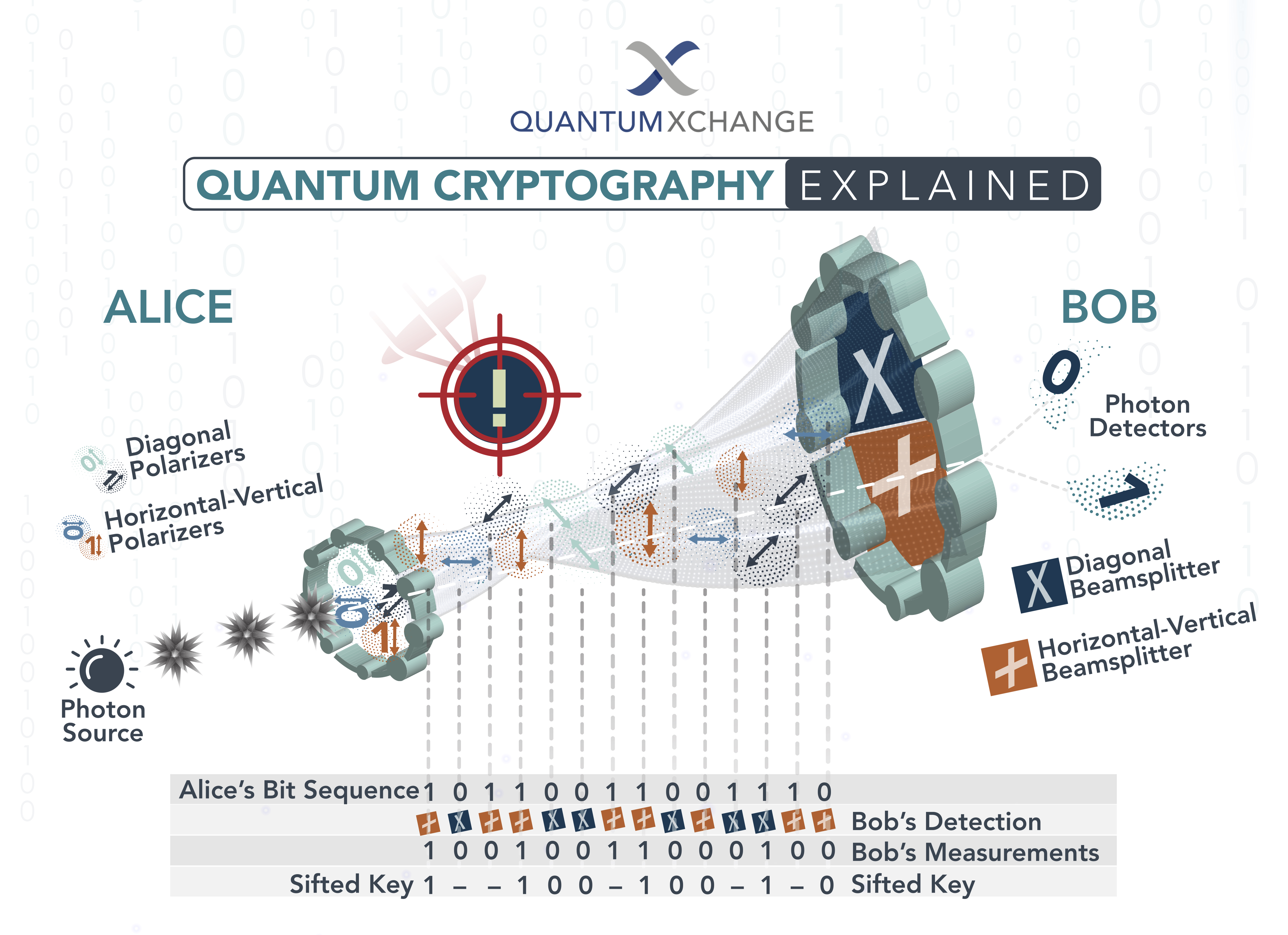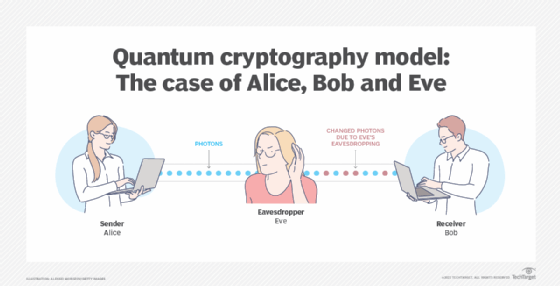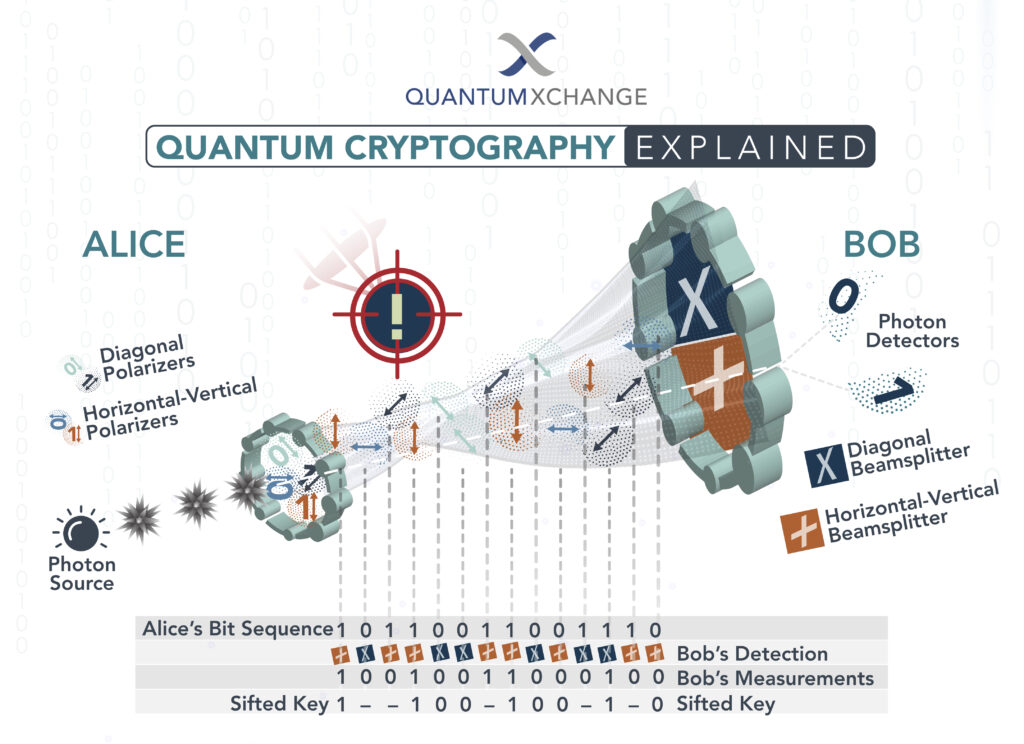Quantum cryptography has become an important topic in the field of information and communication technology (ICT). It is a method of securing communication by using the principles of quantum mechanics to encrypt messages. Unlike traditional cryptography, which relies on mathematical algorithms, quantum cryptography is based on the behavior of subatomic particles.
The idea behind quantum cryptography is that any attempt to intercept or eavesdrop on a message will inevitably alter it in some way. This is because the act of observing a quantum system changes its state. Therefore, if an eavesdropper tries to intercept a message, the sender and receiver will be able to detect the interference and know that the message has been compromised. This makes quantum cryptography an extremely secure method of communication, as it is virtually impossible to hack or intercept.
Quantum cryptography in ICT is a technology that uses quantum mechanics to encrypt data and enable secure communication. It is based on the principles of quantum mechanics, which are used to generate and distribute a secure key to two parties. This key can then be used to encrypt and decrypt messages. Quantum cryptography is considered to be the most secure form of encryption currently available.

What is Quantum Cryptography in ICT?
Quantum cryptography is a type of cryptography based on quantum mechanics. It is used to secure communication over a network by using quantum mechanics principles such as entanglement and superposition to create and transmit a secure key for encryption and decryption. Quantum cryptography is considered to be one of the most secure methods of communication available, as it is virtually impossible to hack.
How Does Quantum Cryptography Work?
Quantum cryptography works by using the principles of quantum mechanics to generate a secure key for encryption and decryption. A sender and a receiver both generate a shared secret key, which is used to encrypt and decrypt messages sent over a network. The sender and receiver then use the shared key to encrypt and decrypt their messages, ensuring that only the intended recipient can read the message.
The key is generated using a process known as quantum key distribution (QKD). This process involves using the properties of quantum mechanics, such as entanglement, to generate a random key that can be used to encrypt and decrypt messages sent over a network. The key is generated using a series of measurements on a randomly chosen set of qubits. The measurements are performed by the sender and receiver separately, and the results are compared to ensure that the key is identical at both ends.
Benefits of Using Quantum Cryptography
Quantum cryptography offers several advantages over traditional methods of encryption. It provides the highest level of security available, as it is virtually impossible to hack. It also provides an additional layer of security, as the key is not stored anywhere, meaning that it cannot be stolen or compromised.
Quantum cryptography also offers greater speed and efficiency. As the key is generated instantly and is not stored anywhere, messages can be sent and received quickly and securely. This makes it ideal for use in applications such as banking and financial transactions, where speed and security are critical.
Finally, quantum cryptography is also cost-effective. As the technology is still in its early stages, it is relatively inexpensive to implement, making it an attractive option for many businesses.
Frequently Asked Questions about Quantum Cryptography in ICT
Quantum cryptography is a technology used to secure digital communication, with the help of the laws of quantum mechanics. It provides security through a cryptographic key generated by exchanging information between two parties. This technology is used in ICT to ensure secure communication between two parties.
What is Quantum Cryptography in ICT?
Quantum cryptography is a type of cryptography that makes use of the principles of quantum mechanics to generate a secure cryptographic key between two parties. This key is used to secure the communication between the two parties. Quantum cryptography provides security by ensuring that any eavesdroppers are detected. This is due to the fact that any attempt to intercept the communication will cause a disturbance in the quantum state of the particles used in the transmission. This disturbance can be detected and the transmission can be aborted.
Quantum cryptography is a relatively new technology that is being used in ICT to provide secure communication between two parties. This technology is being used in a wide range of applications, from secure financial transactions to military communication. The security provided by quantum cryptography is much stronger than traditional cryptography, as it is based on the laws of quantum mechanics.
How does Quantum Cryptography Work?
Quantum cryptography works by exchanging information between two parties using quantum particles. These particles are usually photons, which are the particles of light. The photons are sent from one party to the other and are used to generate a secure cryptographic key. This key is used to encrypt the communication between the two parties.
The communication is secure because any attempt to intercept the photons will cause a disturbance in the quantum state of the photons. This disturbance can be detected, and the transmission can be aborted. This makes it impossible for an eavesdropper to gain access to the communication without being detected.
What are the Advantages of Quantum Cryptography?
The main advantage of quantum cryptography is the security it provides. By using the laws of quantum mechanics, it is impossible for an eavesdropper to access the communication without being detected. This makes it much more secure than traditional cryptography, which can be easily broken.
Another advantage of quantum cryptography is that it is much faster than traditional cryptography. This is because it does not rely on complex mathematical algorithms to generate the cryptographic key. Instead, the key is generated by exchanging information between two parties using quantum particles. This makes it much faster and more efficient.
What are the Disadvantages of Quantum Cryptography?
One of the main disadvantages of quantum cryptography is that it is expensive. The equipment required to generate the quantum particles used in the transmission can be costly. This makes quantum cryptography more expensive than traditional cryptography.
Another disadvantage of quantum cryptography is that it is complex. The technology is based on quantum mechanics, which is a complex and difficult subject to understand. This makes it difficult for many people to use quantum cryptography.
Is Quantum Cryptography the Future of ICT Security?
Quantum cryptography is a relatively new technology that is being used in ICT to provide secure communication between two parties. While it is not yet widely used, it is gaining popularity due to its strong security and efficiency. As the technology continues to improve, it is likely that quantum cryptography will become the standard for ICT security in the future.

Paragraph 1:
In conclusion, quantum cryptography is a rapidly evolving field in ICT that promises to revolutionize the way we secure our data and communications. By leveraging the principles of quantum physics, scientists and researchers have been able to develop cutting-edge cryptographic protocols that are virtually unbreakable by even the most advanced hacking techniques. As we continue to rely more and more on digital technologies for our daily lives, the need for robust and secure communication systems becomes increasingly vital. Quantum cryptography offers a compelling solution to this challenge, and it is exciting to see how the technology will continue to develop and evolve in the coming years.
Paragraph 2:
As with any emerging technology, there are still many unanswered questions and challenges that need to be addressed before quantum cryptography can become a mainstream solution. These include issues around scalability, compatibility with existing systems, and the high cost of implementing quantum cryptography protocols. However, the potential benefits of this technology are undeniable, and it is clear that it has the potential to transform the way we approach security in the digital age. As such, it is essential that we continue to invest in research and development in this area, and work collaboratively to overcome the challenges that stand in the way of realizing the full potential of quantum cryptography in ICT.

